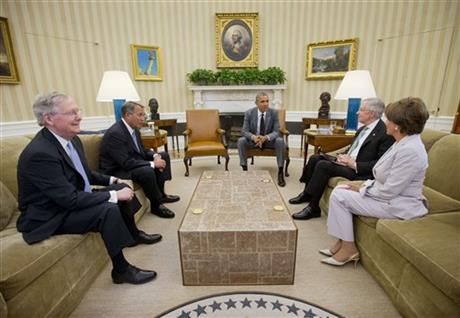
By LARA JAKES and JULIE PACE
President Barack Obama meets with, from left, Senate Minority Leader Mitch McConnell of Ky., House Speaker John Boehner of Ohio, Senate Majority Leader Harry Reid of Nev., and House Minority Leader Nancy Pelosi of Calif., in the Oval Office of the White House in Washington, Wednesday, June 18, 2014. Obama briefed leaders of Congress on US options for blunting an Islamic insurgency in Iraq. US officials say Obama is not yet prepared to move forward with strikes and is instead focused on increased training for Iraq’s security forces, boosting Iraqi intelligence capacities and upgrading equipment. (AP Photo/Pablo Martinez Monsivais)
John Boehner
House Speaker John Boehner of Ohio talks to reporters during a news conference on Capitol Hill in Washington, Thursday, June 19, 2014. Boehner and congressional leaders met with President Barack Obama yesterday about the ongoing crisis in Iraq. The speaker charged that terrorism and the unrest in the Middle East had worsened during Obama’s term. (AP Photo/J. Scott Applewhite)
John Kerry
FILE – In this Wednesday, June 18, 2014, file photo, Secretary of State John Kerry gives the keynote address at the 2014 World Food Prize Laureate Announcement Ceremony, at the State Department in Washington. Kerry brushed aside criticism of Obama administration Middle East policy Thursday, June 19, 2014, taking exception to assertions Washington has been too passive in the face of surging terrorism in the region. (AP Photo/Molly Riley, File)
Barack Obama
President Barack Obama pauses while speaking about the situation in Iraq, Thursday, June 19, 2014, in the Brady Press Briefing Room of the White House in Washington. Obama said the US will send up to 300 military advisers to Iraq, set up joint operation centers. (AP Photo/Pablo Martinez Monsivais)
Prev
2 of 5
Next
WASHINGTON (AP) — Holding back from more robust options, President Barack Obama on Thursday said he was dispatching up to 300 military advisers to Iraq to help quell the rising insurgency in the crumbling state. He called on Iraqi leaders to govern with a more “inclusive agenda” to ensure the country does not descend into civil war.
Obama left open the option of “targeted” military action in the future, and he said the U.S. also would increase its intelligence efforts in Iraq and was prepared to create joint operations centers with Iraqis. But he was adamant that U.S. troops would not be returning to combat in Iraq.
“We do not have the ability to simply solve this problem by sending in tens of thousands of troops and committing the kinds of blood and treasure that has already been expended in Iraq,” Obama told reporters in the White House briefing room. “Ultimately, this is something that is going to have to be solved by Iraqis.”



